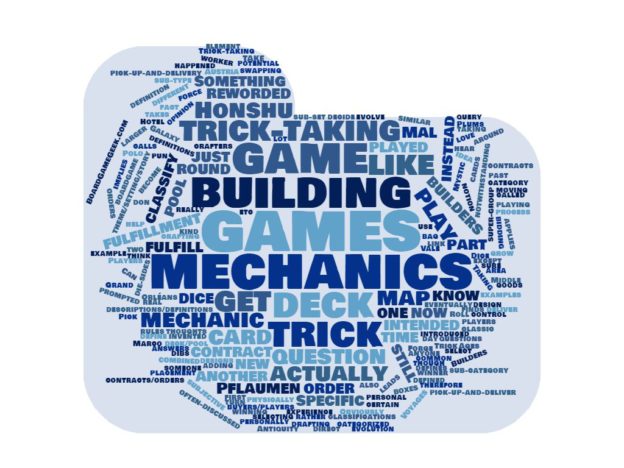How we classify game mechanics is an often-discussed part of boardgame design. We all know the classic mechanics – worker placement, deck building, trick taking, area control, etc.
But when does a specific mechanic grow into something different? The examples that prompted this question are the games Pi Mal Pflaumen (or “Plums” in the US) and Honshu. They are both categorized as Trick-taking games (Honshu in fact calls itself a trick-taking game in its rules): Players each play a card to the “trick” each round, for sure, and there is a ‘winner’ for the round, but they don’t actually TAKE that trick. They just get first dibs on selecting one of the played cards, and all other players get to then select a card from those played, in ‘winning’ order.
I would personally define that as “turn order bidding” and then “drafting”, NOT trick-taking. Can it still be defined as trick-taking if no one takes the trick? Is this therefore an evolution of trick-taking which could now be called “trick playing” instead, of which trick-taking is a sub-category?
The same query applies to games in which you have “contracts” or “orders” to fulfill. A lot of these are pick-up-and-deliver games, but the definition of “Pick up and deliver” implies a map element for moving the goods around. There are games that have no map but still have contracts/orders to fulfill (The Builders: Middle Ages & Antiquity, Grand Austria Hotel, Voyages of Marco Polo – where the map doesn’t play a direct part in the contract fulfillment process). So is pick-up-and-delivery actually a sub-type of a larger category of “contract fulfillment”?
An example of how this has happened in the past is deck builders. BoardGameGeek.com now defines the mechanic “deck/pool building games” instead of “deck building games” after games like Orléans introduced the notion of “bag building”, and games with “dice building” (not just adding dice to your pool, like Roll for the Galaxy, but also physically swapping die-sides out, as in Dice Forge). So deck building is really a sub-set of pool building. And what of card crafting games like Mystic Vale? Are they deck builders, or deck “crafters”?
So mechanics, and their descriptions/definitions, evolve over time and eventually become something new. Or are mechanics definitions reworded and reworded over time until someone finds a common link between two or more mechanics, which are then combined into a “super-group”?
Obviously this is all subjective – classifications like this aren’t intended to force games into certain ‘boxes’ (no pun intended), but rather to help potential buyers/players get an idea of what kind of game play experience they’ll get from a specific game (theme/setting/story notwithstanding). And I have no real answers to any of these questions (except that I don’ think Pi Mal Pflaumen or Honshu are actually Trick Taking games – that’s my personal opinion though!). I’d love to hear if anyone has similar thoughts about game mechanics, and how they decide to classify the mechanics they use in their own game designs.
This leads me on to another question: How do you know if you’ve invented a new game mechanic? But that’s a question for another day…
